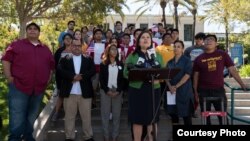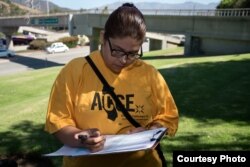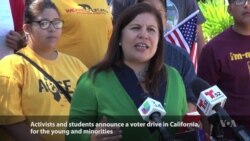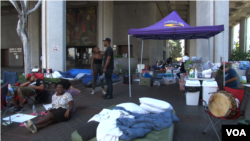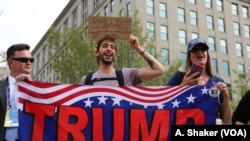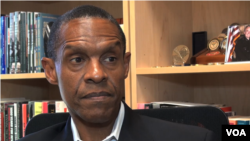As activists rally this week and next outside the major political conventions in Cleveland and Philadelphia, other groups are promoting their messages in so-called echo events in their local communities.
Thursday night, as Donald Trump formally accepts the Republican nomination in the race for president, Republicans will hold convention watch parties in homes around the country, and trade unionists and activists will operate a phone bank in Las Vegas. They will urge Nevadans not to vote for him.
On Wednesday, Hispanic leaders gathered in Orlando, Florida, to denounce Trump for his statements critical of Mexican immigrants.
In California, six community organizations this week announced a drive called the Million Voters Project, aimed at registering new voters ahead of the November 8 presidential election. It was timed to coincide with the political conventions, said Angelica Salas of the Coalition for Humane Immigrant Rights of Los Angeles, standing alongside two dozen student volunteers.
“We really thought about what we wanted to do in response to what we see as the vitriol and hate” aimed at their communities, she said. "What we wanted to demonstrate is really the gathering of forces.”
California voter concerns
Seven million eligible Californians do not vote, said Karla Zombro of voter mobilization group California Calls. She said many are young and unregistered, “or people who just don't believe that voting is going to make a difference, and so they choose not to register. And so our job isn't just a technical 'get the piece of paper in front of them.' It's about inspiring people to not let someone else make decisions for us.”
WATCH: Voter Drive in California Underway
Dolores Huerta, co-founder of the United Farm Workers, has attended most Democratic national conventions since 1968, most often as a delegate, and she will be a delegate and member of the convention rules committee in Philadelphia. She said people outside and inside the convention hall would be trying to influence the party platform, the statement of principles on which the presidential candidate will run.
Hillary Clinton is expected to accept the Democratic nomination, and Huerta said that with many black and brown faces among the delegates, the Democrats are more diverse than Republicans — though they still can do a better job of embracing minorities.
“Community pressure on the delegates” is a good thing, said Huerta, since “that's the way democracy works.”
Security at the two conventions has been heightened following the recent attacks in Dallas, Texas, and Baton Rouge, Louisiana, which left eight police officers dead and a dozen injured. The gunmen in both shootings were African American, and the attacks followed the killings by police of two African-Americans in Baton Rouge and near St. Paul, Minnesota.
Tensions have been high around the country, and activists in Los Angeles have been holding a sit-in at City Hall, demanding that Police Chief Charlie Beck resign over a police shooting last year of an African-American woman. Police said the woman was wielding a knife and that the shooting was justified.
Myriad 'echo events'
Emotions also are running high outside the convention sites. Groups opposed to one another in Cleveland have included the Black Lives Matter movement and the self-described fascists of the Traditionalist Worker Party, which seeks an end to what it calls “federal tyranny and anti-Christian degeneracy.” That organization was the target of an attack by counterprotesters at a rally last month in Sacramento, California, where 10 people on both sides were injured, two of them critically.
Among the activists in Cleveland is Lynne Tramonte of America's Voice, which seeks a path to citizenship for millions of undocumented immigrants. She said she was worried about security at both conventions.
“There's a lot of concern from people who want to exercise rights to free speech, that there may be people coming out who mean them harm,” she said.
Tramonte noted that many Cleveland protesters had been trained by organizers to avoid confrontations and that peacekeepers were dispersed throughout the crowd.
Many of the same groups will rally outside the Democratic convention next week. Tramonte said “immigration reform, poverty, police violence ... we haven't gotten enough results out of our leaders yet,” so the Democrats, who now hold the presidency, can expect protests.
Laura Steiner, a California Democrat, will attend next week's Democratic convention in Philadelphia as a delegate for candidate Bernie Sanders. She also plans to join rallies on the street against the Trans-Pacific Partnership, a Pacific Rim trade pact, and fracking, a controversial method of extracting oil and natural gas.
She said “there are hotheads in any movement,” but that public disturbances would only distract from what she considers important issues.
Superdelegate system
Protests and rallies in Philadelphia will call for an end to the superdelegate system, which sends party leaders and elected officials to the Democratic National Convention as unbound delegates, free to support the candidate of their choice, and — critics say — likely to support establishment candidates.
Other delegates are pledged to specific candidates in a democratic process of primary elections and caucuses. Demonstrations for the reform of gun laws and LGBT rights also will be held under the banner Occupy DNC.
While police are on alert in the two convention cities, security expert Erroll Southers of the University of Southern California worried that a different kind of “echo” event could spread disturbances from the convention sites to other cities.
He called the conventions a “perfect storm” of issues involving “race, religion, ethnicity, national origin, immigration, sexual orientation.” He said social media can promote healthy debate on important topics but can also potentially spread the anger if things go wrong.




